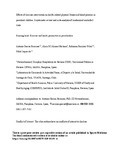Mostrar el registro sencillo del ítem
Effects of exercise intervention on health-related physical fitness and blood pressure in preschool children: a systematic review and meta-analysis of randomized controlled trials
| dc.creator | García Hermoso, Antonio | es_ES |
| dc.creator | Alonso Martínez, Alicia | es_ES |
| dc.creator | Ramírez Vélez, Robinson | es_ES |
| dc.creator | Izquierdo Redín, Mikel | es_ES |
| dc.date.accessioned | 2020-06-05T10:28:32Z | |
| dc.date.available | 2020-09-25T23:00:10Z | |
| dc.date.issued | 2020 | |
| dc.identifier.issn | 0112-1642 | |
| dc.identifier.uri | https://hdl.handle.net/2454/37091 | |
| dc.description.abstract | Background: No previous systematic review has quantitatively examined the effect of physical exercise interventions on health-related physical fitness and blood pressure in children younger than 6 years old. Objective: To evaluate the effects of exercise interventions on health-related physical fitness (i.e., physical fitness components and body composition) and blood pressure in preschoolers. Methods: We searched four databases. Only randomized controlled trials (RCTs), evaluating the effectiveness of exercise intervention on weight-related outcomes, blood pressure, and physical fitness components in preschoolers (1–5.99 years old) were included. The effect sizes were reported as Hedges’ g using random-effects models. Results: A total of 19 RCTs were included. Exercise interventions favored reductions in body mass index (g = − 0.17; 95% confidence interval [CI], − 0.31 to − 0.03), waist circumference (g = − 0.25; 95% CI − 0.47 to − 0.03), and body fat percentage (g = − 0.31; 95% CI − 0.60 to − 0.23); as well as improvement in cardiorespiratory fitness (g = 0.25; 95% CI 0.08–0.42), muscular strength (g = 0.25; 95% CI 0.09–0.40), and speed–agility (g = − 0.51; 95% CI − 0.78 to − 0.24). Blood pressure was not reduced. The subgroup analysis revealed that physical exercise alone favored larger reductions in body mass index and waist circumference compared with physical exercise combined with another intervention. Also, changes in cardiorespiratory fitness, lower-body muscular strength and speed–agility were associated with larger decreases in body composition. Conclusion: Physical exercise whether combined or not with additional intervention has a small effect on both body weight and physical fitness in preschoolers. Also, it seems that interventions to prevent obesity should be directed towards improving physical fitness of preschoolers. | en |
| dc.format.extent | 87 p. | |
| dc.format.mimetype | application/pdf | en |
| dc.language.iso | eng | en |
| dc.publisher | Springer | en |
| dc.relation.ispartof | Sports Medicine, 2020, 50 (1), 187-203 | en |
| dc.rights | © 2019, Springer Nature | en |
| dc.subject | Physical exercise | en |
| dc.subject | Children | en |
| dc.subject | Blood pressure | en |
| dc.title | Effects of exercise intervention on health-related physical fitness and blood pressure in preschool children: a systematic review and meta-analysis of randomized controlled trials | en |
| dc.type | info:eu-repo/semantics/article | en |
| dc.type | Artículo / Artikulua | es |
| dc.contributor.department | Ciencias de la Salud | es_ES |
| dc.contributor.department | Osasun Zientziak | eu |
| dc.rights.accessRights | info:eu-repo/semantics/openAccess | en |
| dc.rights.accessRights | Acceso abierto / Sarbide irekia | es |
| dc.embargo.terms | 2020-09-25 | |
| dc.identifier.doi | 10.1007/s40279-019-01191-w | |
| dc.relation.publisherversion | https://doi.org/10.1007/s40279-019-01191-w | |
| dc.type.version | info:eu-repo/semantics/acceptedVersion | en |
| dc.type.version | Versión aceptada / Onetsi den bertsioa | es |


